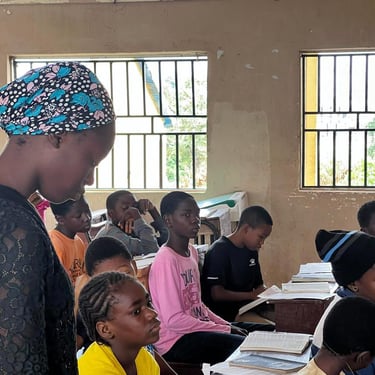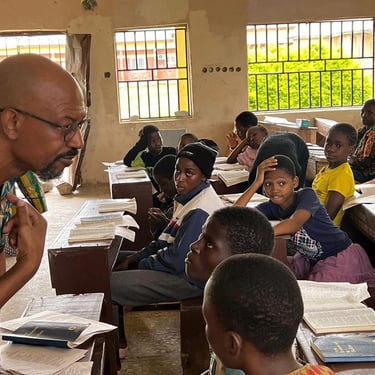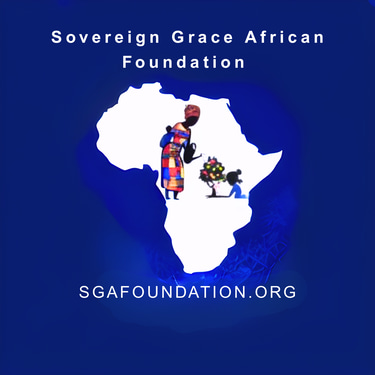Week 99 - Free Weekend Program for Children
9/19/20255 min read
Date : 12 July, 2025
Text : Genesis 14: 17-24
Theme: Living for the Glory of God Alone
After Abraham rescued Lot and others (people from Sodom), having defeated the enemy kings, two very different kings came out to meet him. One was the king of Sodom, who represents worldly corruption—compromise, riches, and the values of a fallen world and its system.
The other was Melchizedek, king of Salem and priest of God Most High, who foreshadows Christ, the King of Righteousness and the Prince of Peace. Christ alone is our righteousness and our peace (Jeremiah 23:6; Isaiah 9:6). We do not receive Him through our works or merits, but through faith in His shed blood—offered freely for our redemption.
This is beautifully pictured in the bread and wine that Melchizedek brings to Abraham, a type of the communion table—the Lord’s Supper—through which we remember and proclaim Christ’s finished work on the cross (1 Corinthians 11:26).
It is evident from this text that God’s grace finds us not only in our failures but also in our victories—especially when we are exhausted and vulnerable. Sometimes, success can be more spiritually dangerous than failure, leading to pride, complacency, or compromise. But true peace is not found in our accomplishments or circumstances; it is found only in Christ (John 14:27). Grace meets us in Christ, our eternal High Priest, and in Him we receive the true riches of heaven—contentment, joy, peace with God—the abundant life, the Zoe life, the very life of Christ Himself (1 John 5:12).
This grace produces worship and obedience. Abraham, having been blessed by Melchizedek, gave a tenth of all he had—not under compulsion or obligation to the law, but from a heart of gratitude. This happened long before the law was given through Moses, showing us that genuine giving flows from a heart of love, prompting true worship—thanksgiving, not regulation (Luke 7:47). In the same way, our offerings, service, and obedience must flow from a heart transformed by the mercy and grace of God.
If our giving is motivated by selfish gain—such as “give to get,” or “stoop to conquer,” or even a form of humility that is secretly motivated by self-exaltation—it is not acceptable before God. These motives, though often paraded as spirituality, are rooted in covetousness and pride; they have no place in the kingdom of God (Ephesians 5:5).
Therefore, we must continually pray that the Lord purges our hearts and motives by the washing of water through His Word, so that our offerings may be acceptable to Him. Love, gratitude, and sincere thanksgiving must be the driving force behind our service—not obligation or the desire for reward, approval, or recognition. As Scripture says, “We love because He first loved us” (1 John 4:19). Our giving today must be a response to Christ’s love—not obligatory or transactional.
After Abraham had received the blessing from Melchizedek—a holy, sacred moment pointing to Christ—the king of Sodom approached him with an offer of worldly wealth. But Abraham rejected it. Why? Because he did not want anyone to say, “I made Abram rich.” His trust was in God alone. He would not compromise the glory of God by accepting gain from a corrupt source.
This is the posture of one who has truly encountered grace: they will not share God’s glory with the world, nor attribute their success to the arm of flesh. The apostle Peter displayed the same heart in Acts 3, when the lame man at the Beautiful Gate was healed through him. The crowd rushed toward him in amazement, but Peter, refusing to accept any glory, said, “Why do you look so intently at us, as though by our own power or godliness we had made this man walk?… The God of our fathers glorified His Servant Jesus” (Acts 3:12–13).
Likewise, in Acts 14:11–18, when Paul and Barnabas healed a crippled man in Lystra, the people attempted to worship them as gods. But they tore their clothes in grief and cried out, “Why are you doing these things? We also are men with the same nature as you, and preach to you that you should turn from these useless things to the living God.” They refused to allow human praise or spiritual confusion to rob God of His glory. Their passion was not just for sound doctrine—it was for God’s glory and honor above all.
Abraham’s refusal of the king of Sodom’s offer reflects this same spiritual integrity. It was not about pride or legalism—it was about preserving the testimony that it was God alone who had made him rich. He was not ashamed to receive from God’s appointed priest, but he refused to enrich himself through ungodly means.
Yet notice Abraham’s fairness—he allowed his fellow warriors to take their portion. He did not impose his personal conviction upon others. This distinction is vital: personal conviction must never become a burden laid upon the consciences of those who labor alongside us. Accepting support freely given is not a sin. It becomes a problem only when support is demanded through pressure, manipulation, or entitlement.
This is an important lesson for us all: no matter how gifted or successful in ministry, we must never feel entitled to the resources or possessions of those we serve. While it is good and biblical to accept help when offered freely (Philippians 4:14–18), it must never be through coercion or expectation. Like Paul, we must be willing, when necessary, to set aside our rights for the sake of the gospel. In 1 Thessalonians 2:9, Paul reminded the believers, “Surely you remember, brothers and sisters, our toil and hardship; we worked night and day in order not to be a burden to anyone while we preached the gospel of God to you.”
Freely we have received, and freely we must give (Matthew 10:8)—not seeking praise, gain, or acknowledgment from those we help. We must live and serve in such a way that, like Peter, Paul, and Barnabas, Christ alone is glorified—and like Abraham, we can boldly say, “Let no man say he made me rich.”
So how do we discern between godly provision and worldly entanglement in our daily decisions, without slipping into legalism or self-righteousness?
We must ask ourselves sincerely: Are there areas in my life where I am tempted to accept “the king of Sodom’s offer”—whether through unethical shortcuts, people-pleasing, selfish ambition, or compromise for gain? If so, we must repent and ask for grace to walk uprightly before God, trusting Him alone to supply all our needs.
This message teaches us that as we walk in dependence on God, we must also walk in wisdom, humility, and justice. Avoiding worldly entanglements is not about spiritual pride—it is about preserving the purity of our witness and ensuring that all glory goes to God alone.
And so we pray:
“Not to us, O LORD, not to us, but to Your name be the glory, because of Your love and faithfulness” (Psalm 115:1)
We were also greatly enriched by two additional messages this past week. They will be a great blessing to you as well. Please use the links below for more details:
https://www.facebook.com/share/p/16JiwnthXY/?mibextid=wwXIfr
https://www.facebook.com/share/p/1ARiMC6Q9V/?mibextid=wwXIfr
False teachers are ravaging many souls, they know the weakness of our sin nature and depravities, but God is sending help through the power of the true gospel. You’ll find many helpful sermons listed here:



Sovereign Grace African Foundation
Registered Charity:
1. STATE OF CALIFORNIA, USA
File No:4852691, Reg. date - 02/21/2022
2. ABUJA FCT, NIGERIA
Reg No. CAC/IT/NO 149091
Date : 7/29/2020
sgaf.org@gmail.com
